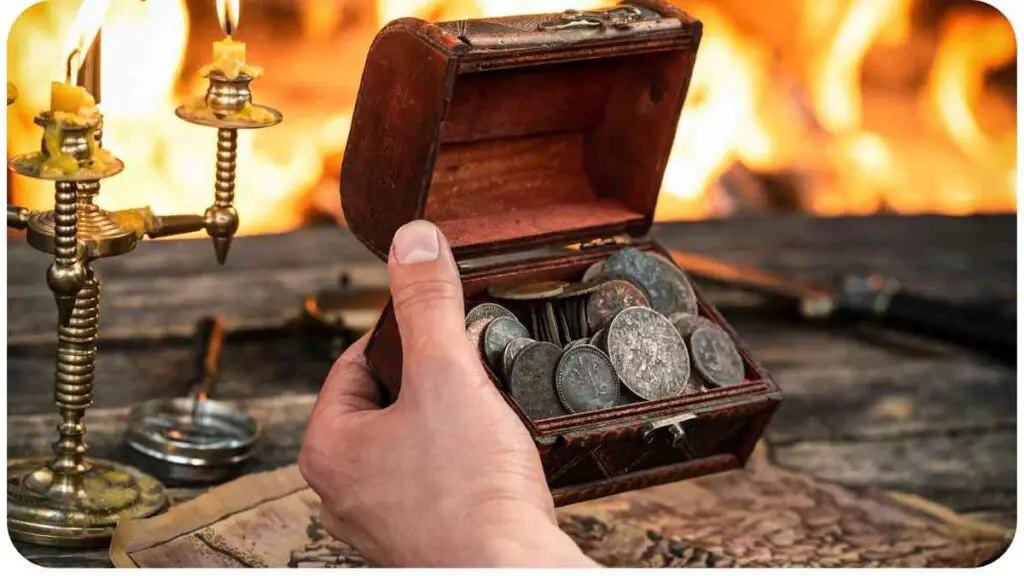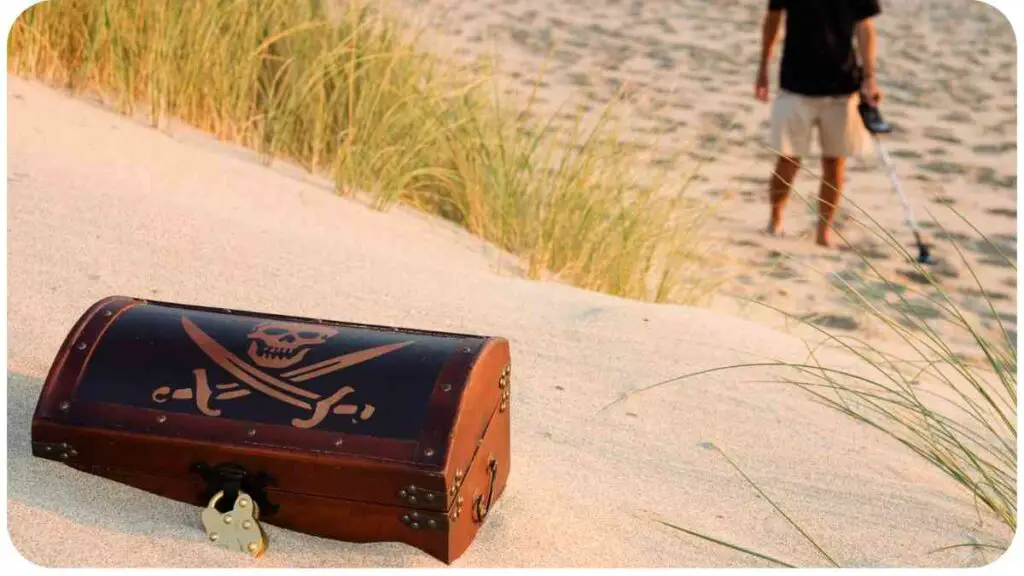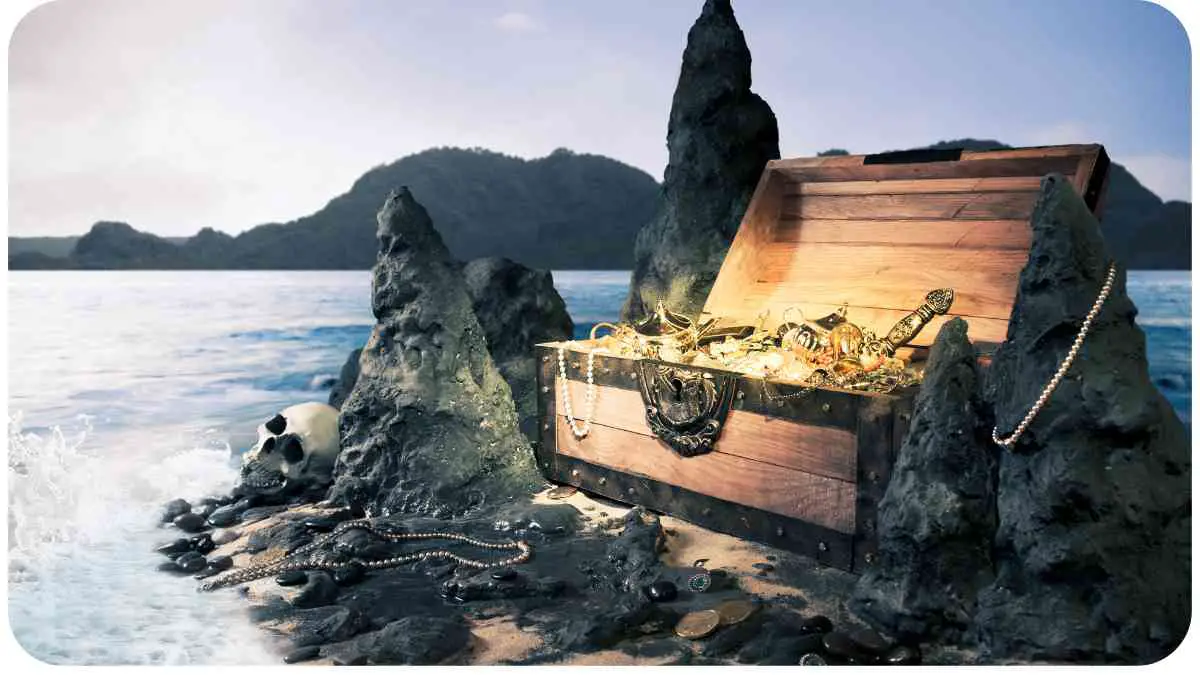Welcome to the exciting world of treasure hunting! Have you ever wondered if searching for hidden treasures can be a profitable endeavor? In this article, we will delve into the pros and cons of treasure hunting and provide valuable insights and tips from experienced treasure hunters like myself.
By understanding the advantages and disadvantages, legal and ethical considerations, as well as effective strategies, you can embark on your treasure hunting journey with confidence.
| Takeaways |
|---|
| 1. Treasure hunting requires research, planning, and strategic searching. |
| 2. Joining treasure hunting communities provides valuable support and knowledge sharing. |
| 3. Investing in quality equipment, such as metal detectors and digging tools, enhances your chances of success. |
| 4. Seek permission and follow regulations when hunting on private property. |
| 5. Patience and persistence are key. Treasure hunting may not yield instant results, but persistence can pay off. |
| 6. Real-life examples, like the Spanish galleon and amateur metal detectorist discoveries, highlight the potential profitability of treasure hunting. |
| 7. Strategies for successful treasure hunting include researching historical sites, utilizing technology, exploring underwater, networking with locals, and documenting finds. |
| 8. Recommended tools and equipment for treasure hunting include metal detectors, digging tools, pinpointers, headlamps, and protective gear. |
| 9. Common challenges in treasure hunting include finding the right locations, dealing with weather and ground conditions, competing with other hunters, handling false signals, and adhering to legal and ethical considerations. |
| 10. Treasure hunting should be conducted within the bounds of the law, respecting cultural heritage and the environment. |
| 11. Frequently asked questions about treasure hunting address profitability, legal regulations, equipment, increasing chances of finding treasures, and the significance beyond financial gain. |
2. What is Treasure Hunting?
Before we dive into the details, let’s define what treasure hunting entails. Treasure hunting is the pursuit of searching for valuable items, artifacts, or treasures that have been lost or buried. These treasures can include ancient coins, jewelry, historical artifacts, and even long-forgotten caches of valuable items. While some treasure hunters are looking for financial gain, others are driven by the thrill of discovery and the passion for preserving history.
Dive into the fascinating world of shipwreck salvage operations, where underwater archaeologists bring lost treasures to light, unveiling the mysteries of the deep sea.
3. The Pros of Treasure Hunting

Treasure hunting offers numerous advantages for enthusiasts willing to dedicate time and effort to their pursuit. Let’s explore some of the key benefits associated with this exciting hobby.
Table 1: Pros of Treasure Hunting
| Pros | Description |
| Excitement and Adventure | Uncover hidden treasures and experience the thrill of discovery. |
| Historical Preservation | Contribute to the preservation of artifacts and historical knowledge. |
| Potential Financial Gain | Discover valuable items that can be sold or collected for a profit. |
| Outdoor Activity | Enjoy being outdoors, exploring new locations, and staying active. |
| Personal Development | Develop patience, discipline, and problem-solving skills. |
| Connection to the Past | Connect with history and learn about different cultures and time periods. |
4. The Cons of Treasure Hunting
While treasure hunting can be an exciting and rewarding endeavor, it’s essential to be aware of the potential challenges and drawbacks. Let’s discuss some of the cons associated with treasure hunting.
Explore the best scuba diving locations and uncover hidden treasures beneath the waves. Immerse yourself in the thrill of the hunt, discovering the most mysterious and valuable treasures.
Table 2: Cons of Treasure Hunting
| Cons | Description |
| Uncertain Return on Investment | The value of the discovered items may not always match expectations. |
| Time and Effort | Treasure hunting requires patience, research, and extensive search efforts. |
| Financial Costs | Acquiring quality equipment and traveling to different locations can be expensive. |
| Legal Barriers | Be aware of regulations regarding treasure hunting in your area to avoid legal issues. |
| Ethical Concerns | Respect local laws, private property rights, and cultural heritage preservation. |
5. Expert Tips and Insights
As an experienced treasure hunter, I have accumulated valuable insights and tips that can enhance your treasure hunting adventures. Here are some expert recommendations to help you make the most of your exploration:
- Research and Plan: Before setting out on a treasure hunting expedition, conducting thorough research is essential. Study historical records, maps, and relevant literature to identify potential treasure-rich areas. Plan your searches strategically to optimize your time and resources.
- Join a Community or Group: Connecting with other treasure hunters can provide invaluable support and guidance. Online forums, social media groups, and local clubs offer opportunities to share knowledge, learn from experienced hunters, and discover new hunting locations.
- Use the Right Equipment: Investing in quality tools and equipment tailored for treasure hunting is crucial. Metal detectors with advanced features, digging tools, pinpointers, and protective gear can significantly enhance your chances of finding valuable items while ensuring your safety.
- Seek Permission and Follow Regulations: Always obtain proper permission before hunting on private property, and respect any designated boundaries or restrictions. Familiarize yourself with local laws and regulations concerning artifact ownership and cultural heritage preservation to avoid legal consequences.
- Be Patient and Persistent: Treasure hunting is not an activity that guarantees instant success. It requires patience and determination. Don’t get discouraged during the initial searches, as even experienced treasure hunters sometimes endure long periods without any significant finds. Keep at it, and your efforts will eventually pay off.
Embark on a journey filled with excitement as you delve into stories of incredible antique discoveries. From flea markets to estate sales, learn the art of finding hidden treasures in unexpected places.
6. Case Studies and Real-Life Examples
To illustrate the potential profitability of treasure hunting, let’s explore a couple of real-life examples:
- The Spanish Galleon: In 1985, the discovery of a Spanish galleon, the Nuestra Señora de Atocha, off the Florida Keys yielded an estimated value of $450 million. This find demonstrates the immense potential for uncovering valuable treasures that can have a life-changing impact.
- Amateur Metal Detectorist’s Lucky Find: In 2012, a metal detector enthusiast stumbled upon a hoard of over 52,500 Roman coins in England. The coins, dating back to the 3rd century, were appraised at around £3.3 million ($4.3 million). This impressive discovery highlights the unexpected fortunes awaiting passionate treasure hunters.
7. Strategies for Successful Treasure Hunting

Successful treasure hunting requires a combination of knowledge, skill, and perseverance. Here are some strategies to help you maximize your chances of finding valuable treasures:
Table 3: Strategies for Successful Treasure Hunting
| Strategies | Description |
| Research Historical Sites | Identify historically significant areas, such as old battlefields, abandoned settlements, or sites of ancient civilizations. Research local history and legends for clues on potential treasure locations. |
| Utilize Technology | Make use of advanced metal detectors and other scanning equipment that can detect buried objects more effectively and accurately. Combining technology with your knowledge of historical artifacts and treasures can significantly increase your discoveries. |
| Explore Underwater | If you’re interested in underwater treasure hunting, consider investing in scuba diving equipment, underwater metal detectors, and mapping tools. Shipwrecks, submerged cities, and lost artifacts await those who dare to explore beneath the waves. |
| Network with Locals | Locals often have valuable knowledge about their area’s history, folklore, and potential treasure hotspots. Establish connections with historians, long-time residents, or professional archaeologists who can provide insights and tips on promising locations. |
| Document and Catalogue Finds | Keep thorough records of your findings, including location, date, and any significant details. This documentation helps advance historical research and can assist in future investigations or potential sales. |
8. Tools and Equipment for Treasure Hunting
Having the right tools and equipment can significantly impact your treasure hunting success. Here are some recommended tools and equipment to consider:
Plunge into the mysterious and fascinating treasures found while scuba diving. Discover the underwater wonders that have captivated explorers and enthusiasts, revealing the secrets of the deep.
Table 4: Recommended Tools and Equipment for Treasure Hunting
| Tools and Equipment | Description |
| Metal Detector | Invest in a high-quality metal detector suited for the type of treasure hunting you plan to undertake. Consider features like different search modes, target ID capabilities, and adjustable settings for various ground conditions. |
| Digging Tools | Carry a sturdy shovel, trowel, and sand scoop for efficient excavation and retrieval of buried items. Opt for durable and lightweight tools that can withstand rugged terrain. |
| Pinpointer | A handheld pinpointer is a valuable accessory that helps locate and pinpoint the exact location of a buried object after initial detection with a metal detector. |
| Headlamp | A reliable headlamp is essential, especially for night hunts or searching in low-light conditions. Look for a headlamp with a comfortable fit, long battery life, and adjustable brightness settings. |
| Protective Gear | Protect yourself from scrapes, cuts, and the elements by wearing gloves, a hat, sunscreen, and appropriate footwear. In water-based treasure hunting, consider investing in a wetsuit, snorkel, and diving equipment. |
9. Common Challenges in Treasure Hunting and How to Overcome Them
While treasure hunting can be a rewarding pursuit, it also comes with its fair share of challenges. Let’s explore some common obstacles and effective strategies to overcome them:
Table 5: Common Challenges in Treasure Hunting
| Challenges | Strategies to Overcome |
| Finding the Right Locations | Engage in thorough research, consult local experts, join treasure hunting communities, and experiment with different locations to increase your chances of finding valuable treasures. |
| Dealing with Unpredictable Weather | Check weather forecasts before heading out and always be prepared with appropriate clothing and gear. Utilize rain covers or waterproof cases for your equipment to protect them from the elements. |
| Ground Conditions and Interference | Adjust your metal detector settings and ground balance according to the soil type and mineralization. Stay away from areas with high electromagnetic interference, such as power lines or radio towers. |
| Competing with Other Treasure Hunters | Embrace collaboration and networking within the treasure hunting community. Share knowledge, tips, and experiences while respecting each other’s hunting boundaries. |
| Dealing with False Signals | Learn to distinguish false signals from genuine targets by practicing with your metal detector and understanding its various settings. Develop a keen ear for different sounds and target responses. |
10. Legal and Ethical Considerations
Treasure hunting should always be conducted within the bounds of the law and ethical guidelines. Here are some crucial legal and ethical considerations to keep in mind:
- Obtain necessary permits and permissions for treasure hunting, especially on private property or protected archaeological sites.
- Respect cultural heritage and archaeological sites. Do not disturb or damage these important historical resources.
- Follow proper artifact ownership laws and avoid engaging in the illegal trade of cultural artifacts.
- Practice responsible digging and backfilling to minimize environmental impact and restore the area to its original condition.
- Always adhere to local, national, and international laws regarding the discovery and excavation of historical items.
Unearth the top 15 most valuable treasures ever found while scuba diving. From ancient artifacts to lost riches, witness the allure of the underwater world and the treasures it holds.
11. Conclusion
In conclusion, treasure hunting can be a profitable and rewarding endeavor, but it requires a combination of knowledge, skill, and dedication. By understanding the pros and cons, applying effective strategies, using the right tools, and respecting legal and ethical considerations, you can enjoy the thrill of uncovering hidden treasures while contributing to the preservation of our historical heritage.
Remember to approach treasure hunting with a sense of adventure and curiosity. The journey is as valuable as the finds themselves. Happy treasure hunting!
Further Reading
Here are some additional resources to further explore the topic of treasure hunting:
- Is Treasure Hunting Worth It? Explained: This article provides an in-depth exploration of the pros and cons of treasure hunting and delves into the factors that can impact its profitability.
- Is Treasure Hunting More Profitable in the US or in Europe?: Explore this Quora discussion where people share insights and opinions on whether treasure hunting is more profitable in the United States or Europe.
- Scavenger Hunt Business: Pros and Cons: While focused on the business aspect of scavenger hunts, this article discusses the pros and cons of organizing and participating in these types of treasure hunts, offering insights applicable to the broader treasure hunting world.
FAQs
Here are some frequently asked questions about treasure hunting:
Can treasure hunting be profitable?
Yes, treasure hunting can be profitable if you are dedicated, knowledgeable, and lucky. Discovering valuable artifacts, coins, or precious metals can lead to significant financial gains.
Are there legal regulations for treasure hunting?
Yes, there are legal regulations that vary by country and region. It is important to research and comply with these regulations to avoid legal issues, such as trespassing, artifact ownership violations, or disturbance of protected archaeological sites.
What equipment do I need to start treasure hunting?
Basic equipment for treasure hunting includes a metal detector, digging tools like shovels and trowels, and protective gear such as gloves and a hat. Depending on the type of treasure hunting you pursue, additional specialized equipment may be required.
How can I increase my chances of finding valuable treasures?
Researching historical locations, utilizing advanced metal detectors, networking with local treasure hunters, and honing your treasure hunting skills can increase your chances of finding valuable treasures.
Is treasure hunting only about financial gain?
No, treasure hunting offers more than just financial gain. It provides opportunities for adventure, historical preservation, personal development, and a connection to the past and different cultures.

Hi there! My name is Hellen James, and I’m here to talk to you about treasure hunting. I’ve been a fan of treasure hunting ever since I was a kid, and if you’re a fan of treasure hunting or just like the idea of finding a long-lost fortune, then this blog is for you.

